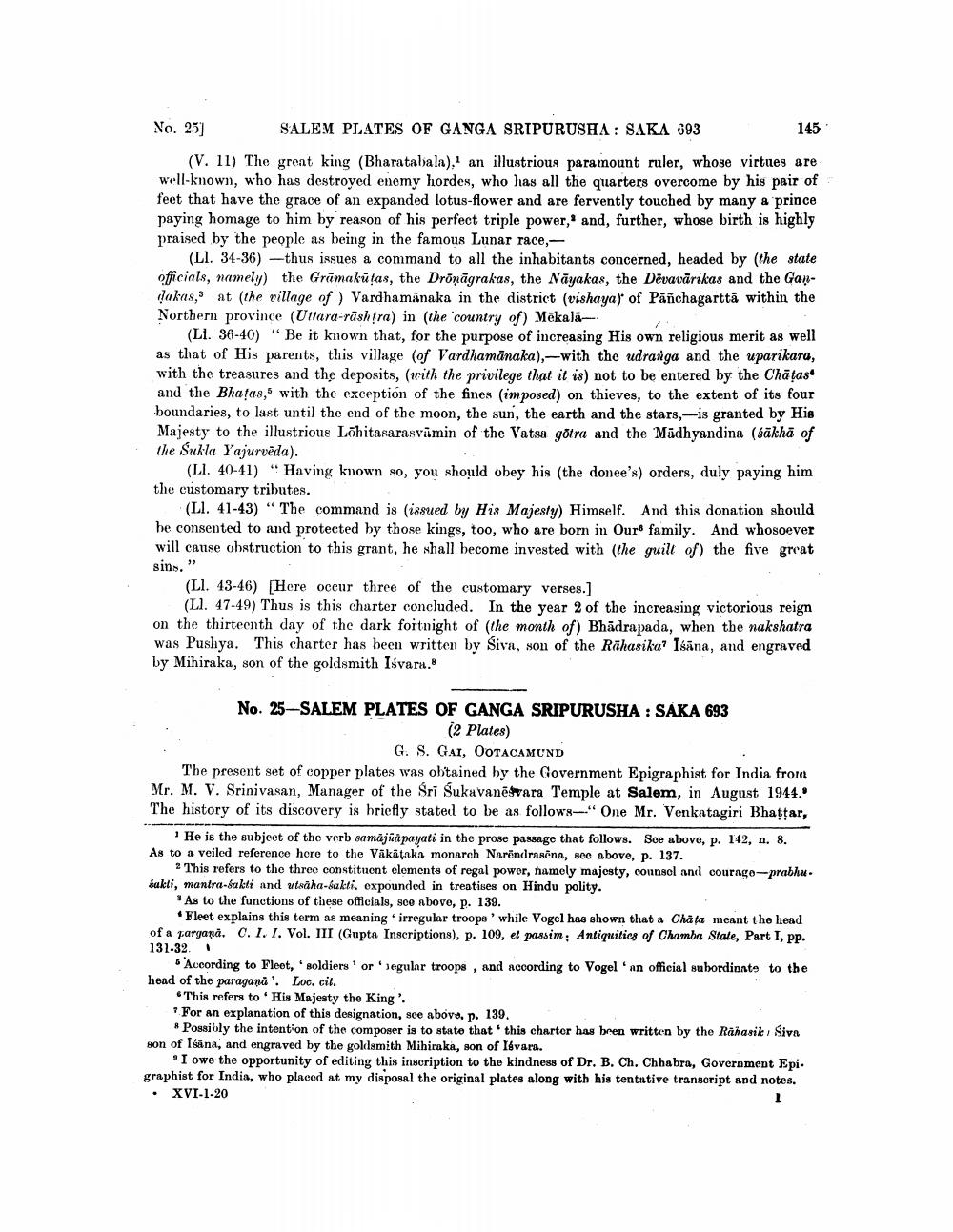________________
145
No. 25) SALEM PLATES OF GANGA SRIPURUSHA: SAKA 693
(V. 11) The great king (Bharatabala). an illustrious paramount ruler, whose virtues are well-known, who has destroyed enemy hordes, who has all the quarters overcome by his pair of feet that have the grace of an expanded lotus-flower and are fervently touched by many a prince paying homage to him by reason of his perfect triple power, and, further, whose birth is highly praised by the people as being in the famous Lunar race,
(Ll. 34-36)-thus issues a command to all the inhabitants concerned, headed by the state officials, namely) the Grūmakūtas, the Drõņāgrakas, the Näyakas, the Devavärikas and the Gandakas, at the village of ) Vardhamanaka in the district (vishaya) of Pāñchagarttā within the Northern province (Uttara-rūshtra) in (the country of) Mēkalā
(LI. 36-40) "Be it known that, for the purpose of increasing His own religious merit as well as that of His parents, this village (of Vardhamanaka),- with the udranga and the uparikara, with the treasures and the deposits, (with the privilege that it is) not to be entered by the Chātas and the Bhatas, with the exception of the fines (imposed) on thieves, to the extent of its four boundaries, to last until the end of the moon, the sun, the earth and the stars,-is granted by His Majesty to the illustrious Löhitasarasvimin of the Vatsa göra and the Madhyandina (sakha of the Sukla Yajurveda).
(LI. 40-41) "Having known so, you should obey his (the donee's) orders, duly paying him the customary tributes.
(LI. 41-43) “The command is (issued by His Majesty) Himself. And this donation should he consented to and protected by those kings, too, who are born in Our family. And whosoever will cause obstruction to this grant, he shall become invested with (the guill of the five great sins."
(Ll. 43-46) [Here occur three of the customary verses.]
(LI. 47-49) Thus is this charter concluded. In the year 2 of the increasing victorious reign on the thirteenth day of the dark fortnight of the month of) Bhadrapada, when the nakshatra was Pushya. This charter has been written by Siva, son of the Rähasiku? Isina, and engraved by Mihiraka, son of the goldsmith Isvara.
No. 25-SALEM PLATES OF GANGA SRIPURUSHA : SAKA 693
(2 Plates)
G. S. GAI, OOTACAMUND The present set of copper plates was obtained by the Government Epigraphist for India from Mr. M. V. Srinivasan. Manager of the Sri Sukavanēstara Temple at Salom, in August 1944.' The history of its discovery is briefly stated to be as follows-"One Mr. Venkatagiri Bhattar,
He is the subject of the verb samajuapayati in the prose passage that follows. Soe above, p. 142, n. 8. As to a veiled reference here to the Väkätka monarch Narêncirasenn, 800 above, p. 137.
? This refers to the three constituent elements of regal power, namely majesty, counsel and courage-prabhu. sukti, mantra-sakli and waha-lakti. expounded in treatises on Hindu polity.
*As to the functions of these officials, soe above, p. 139.
Fleet explains this term as meaning irregular troops 'while Vogel has shown that a Chata meant the head of a bargana. C. I. 1. Vol. III (Gupta Inscriptions), p. 109, et passim: Antiquitics of Chamba Stale, Part I, pp. 131-32.
According to Floot, soldiers' oregular troops, and according to Vogel an official subordinate to the head of the paragana'. Loc. cit.
This refers to His Majesty the King'. For an explanation of this designation, see above, p. 139.
* Possibly the intention of the composer is to state that this charter has been written by the Rahasik Siva son of Tsina, and engraved by the goldsmith Mihiraka, son of Isvara.
I owe the opportunity of editing this inscription to the kindness of Dr. B. Ch. Chhabra, Government Epi. graphist for India, who placed at my disposal the original plates along with his tentative transcript and notes. • XVI-1-20




